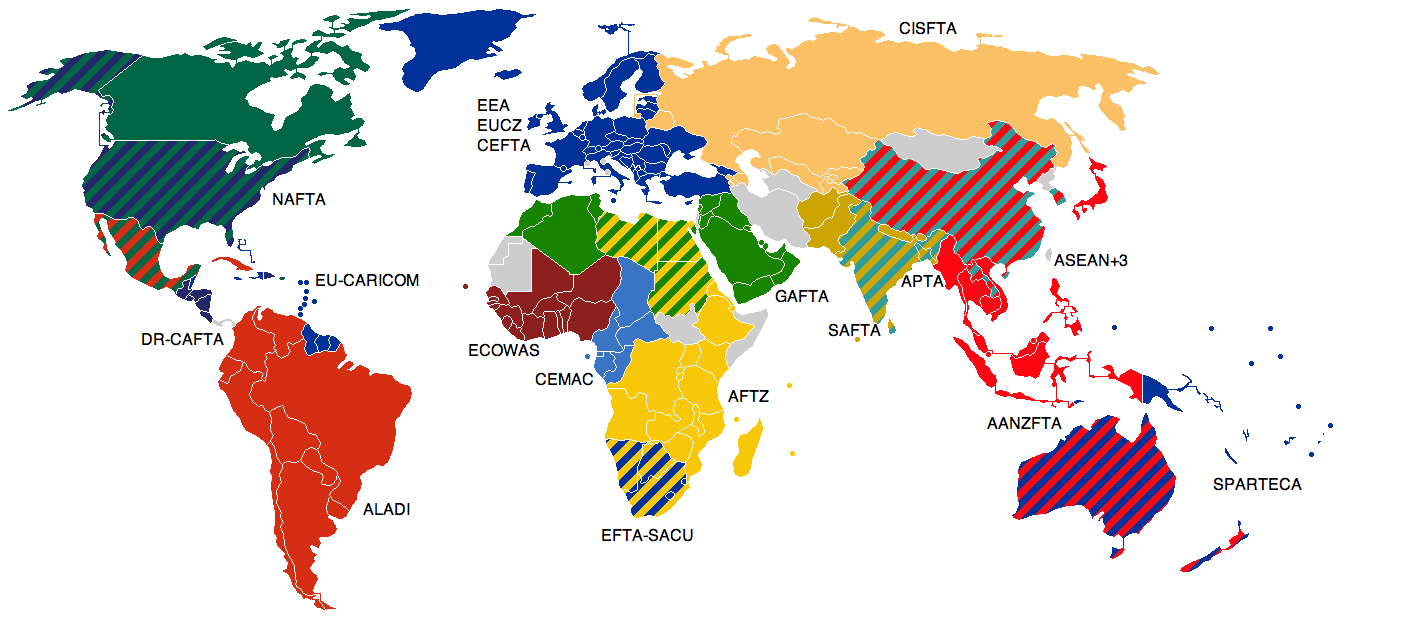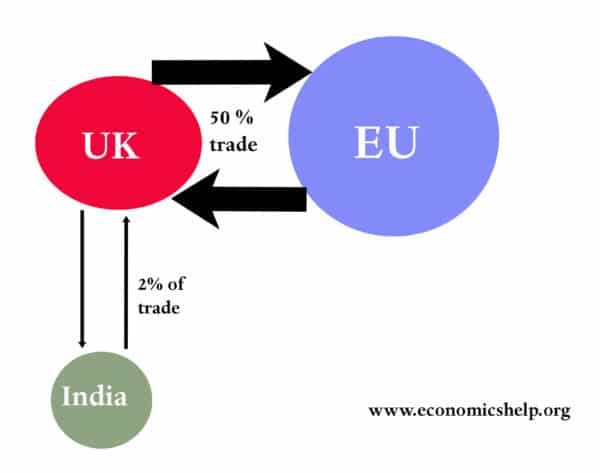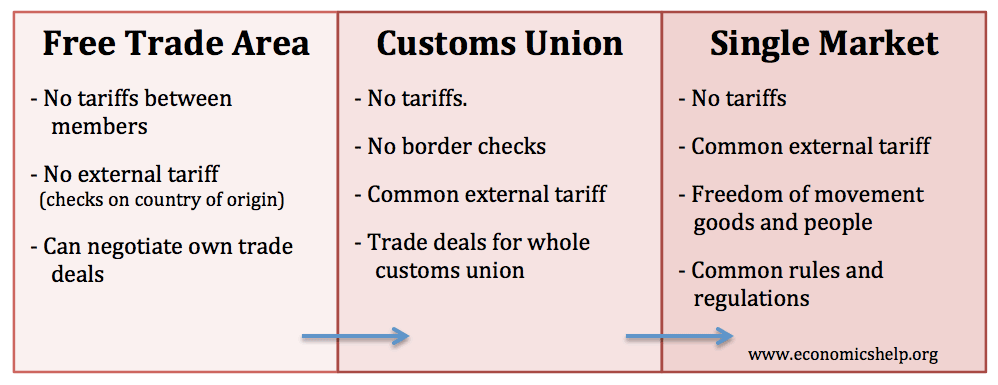Trading blocks are groups of countries who form trade agreements between themselves. Trading blocks can include
- Free trade areas – elimination of tariffs between economies in the trading block
- Customs union – free trade area + a common external tariff with non-members
- Economic union/Single market – Customs union + common rules and regulations.
Different types of trading blocks
Trading blocks have become increasingly influential for world trade.
- They have advantages in enabling free trade between geographically close countries. This can lead to lower prices, increased export potential, higher growth, economies of scale and greater competition.
- However, it can lead to compromise as countries pool economic sovereignty. Also, the move to free trade tends to create winners and losers – with some domestic industries losing out to lower-cost imports.
Examples of Global trading blocks

- European Union – The most integrated trading block. The EU27 have free trade and common regulations and are part of a customs union.
- NAFTA – North Atlantic Free Trade Association. A free trade area between Canada, US and Mexico
- ASEAN Free Trade Area Free trade area in South East Asia founded 1992. Includes: Brunei, Indonesia, Malaysia, Philippines, Singapore and Thailand, Vietnam, Laos, Myanmar and Cambodia.
- SAFTA South Asia free trade area based around the Indian sub-continent. Includes Afghanistan, Bangladesh, Bhutan, India, Maldives, Nepal, Pakistan and Sri Lanka.
- Mercosur – a southern American trading block formed in 1991. Includes full members of Argentina, Brazil, Paraguay and Uruguay. With associate members including Bolivia, Chile, Colombia, Ecuador. Developed from free trade area to become customs union.
- African Union 55 countries of the continent of Africa. Created to forge closer political and economic ties. It has aspirations to become a free trade area.
Difference between free trade area and customs union
A customs union has a common external tariff on imports. This means that it doesn’t matter which country the imports enter – because all countries have the same import tariff. This means there doesn’t need to be internal checking on ‘Rules of origin‘. For example, if imports from Africa enter Spain then if goods travel across the border from Spain to France, there is no need to check whether goods are paying the correct import tariff – because the import tariffs are all the same.
A disadvantage of joining a customs union is that a country is not able to pursue its own independent trade deals. However, since trade deals are complicated and take several years, there is an advantage to negotiating trade deals as part of a regional trade block – rather than separate individual countries.
Advantages of trading blocks
- Tariff removal leads to trade creation – lower prices for consumers and greater opportunity for exporters.
- Increased trade enables increased specialisation – which gives benefits of economies of scale (lower average costs from increased output)

- Catch-up effects. Countries joining a rich trading block can benefit from inward investment and increased trade opportunities. Countries in Eastern Europe have made considerable progress in catching up with average income levels in Western Europe.
- Gravity theory of trade suggests that trade with countries in close proximity is the most important due to lower transport and similar cultural and economic ties.
- Gives small countries a greater say in global trade agreements
- Increased competition. The removal of tariffs creates greater choice for consumers. Therefore domestic firms have a greater incentive to cut costs to remain competitive.
Disadvantages of trading blocks
- Joining a customs union may lead to increased import tariffs – which leads to trade diversion. For example, when the UK joined the EEC customs union, it required higher import tariffs on imports from former Commonwealth countries. This led to switch in demand towards higher-cost European countries and caused loss of business for Commonwealth countries
- Increased interdependence on economic performance in other countries in trading block. If Eurozone goes into recession, it will affect all countries in the Eurozone. However, this is almost inevitable even if countries are not formally in a trading block due to a close relationship between trade cycles in different countries.
- Loss of sovereignty and independence. A trading block needs to make decisions for the whole area. This may go counter to the particular wishes of a country.
- Increased influence of multinationals. In a bilateral deal between the US and South-East Asian trading block. Free trade may come at the price of allowing free movement of capital. This can have benefits in terms of inward investment. But, can also have costs for higher-cost domestic producers. Free trade can lead to structural unemployment as resources shift from uncompetitive industries to newer industries.
Related

